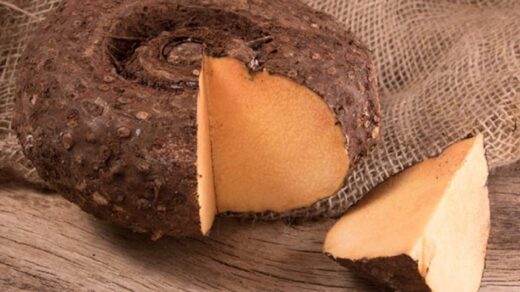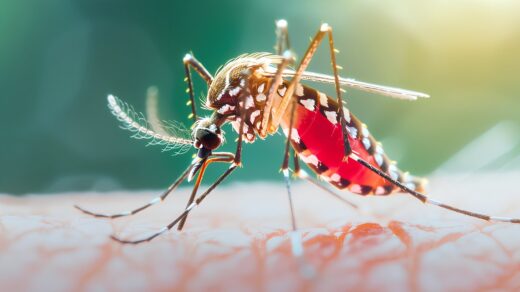Castor Oil Uses for Hair Growth: From Thin to Thickness
Castor oil stands as one of the most effective home remedies for addressing hair issues. Yes, you read that right – castor oil! This oil has been a familiar presence since childhood, often touted as Granny’s favorite solution for a wide range of problems. 
Castor oil doesn’t just provide a superficial fix; it offers a holistic approach that addresses issues at their root. While castor oil is commonly known for its use as a laxative, its natural properties extend far beyond that.
With inherent antiviral and antimicrobial properties, castor oil proves to be highly beneficial for skin health. Furthermore, its contributions to hair growth are nothing short of essential.
What is Castor Oil?
Castor oil, scientifically known as Ricinus communis, is a nutrient-rich vegetable oil extracted from castor beans. While its origins can be traced back to tropical East Africa, it has found widespread use for both cosmetic and medicinal purposes in regions such as India and the West Indies.
Typically, castor oil is transparent or pale yellow in color. However, when it undergoes processes like roasting or boiling, it takes on a darker hue and is referred to as black castor oil. It’s important to note that while castor oil offers numerous benefits, the seeds and beans of the castor plant contain toxins that can be harmful and even fatal if ingested. Therefore, it is crucial to avoid consumption of these parts.
Types of Castor Oil
When selecting castor oil for your needs, it’s important to understand the distinctions among the various types available:
1. Castor Oil: This type of castor oil is derived from fresh castor seeds through a cold-pressing method. It involves applying extreme pressure, similar to the process used for juicing, to extract the oil.
2. Black Castor Oil: To produce black castor oil, castor seeds are first roasted and then heated before the oil is extracted. This process imparts a distinct color and potential benefits.
3. Jamaican Castor Oil: Jamaican castor oil goes through a unique preparation process. Castor seeds are roasted, crushed, and ground using a mortar and pestle. They are then heated in water until boiling and finally pressed with a pressing device.
Jamaican castor oil is often considered the most beneficial among these three types. This is because it typically undergoes minimal processing and is dark in color.
A result of the roasting process may also contribute to enhancing the appearance of your beard, making it appear darker and more vibrant.
Castor Oil Benefits for Hair Regrowth
1. Promotes Hair Growth
Among the most renowned advantages of castor oil is its remarkable ability to stimulate hair growth. This natural elixir is abundantly rich in ricinoleic acid, a component that plays a pivotal role in enhancing blood circulation to the scalp.
As a consequence, this improved blood flow nourishes the hair follicles, resulting in a significant boost to hair growth. With regular application, you can expect to witness the transformation of your hair into a thicker and longer mane of beauty.
2. Strengthens Hair
Castor oil is packed with vital nutrients such as vitamin E, minerals, and proteins, all of which play a crucial role in fortifying the hair shafts. This fortification makes your hair less susceptible to breakage, ensuring that it remains resilient and healthy.
Additionally, castor oil forms a protective layer over your hair, shielding it from potential damage caused by environmental factors. This dual action contributes to stronger and more durable locks.
3. Prevents Hair Loss
Dealing with hair loss can be a source of considerable distress. However, castor oil comes to the rescue with its rich content of ricinoleic acid. This valuable component not only stimulates hair growth but also acts as a shield against hair loss.
By strengthening the hair roots, castor oil significantly reduces the likelihood of premature hair fall, providing you with healthier and more resilient hair.
4. Moisturizes and Conditions
Dry and brittle hair can be a source of various hair-related woes. Thankfully, castor oil emerges as an excellent natural conditioner to combat this issue.
It has the unique ability to penetrate deeply into the hair shaft, delivering much-needed moisture and nourishment. This deep hydration plays a pivotal role in maintaining hair that is not just soft but also silky and lustrous.
5. Fights Dandruff
Dandruff, an uncomfortable and embarrassing condition, can be effectively addressed with the help of castor oil. This natural elixir possesses potent antifungal properties that work wonders in combating dandruff.
Through regular massaging of castor oil into the scalp, this common issue can be alleviated, leaving you with a flake-free and healthier scalp.
6. Adds Shine and Luster
Are you dreaming of achieving glossy, shiny locks? Castor oil holds the key to turning that dream into reality. This remarkable oil has the ability to coat each individual hair strand, imparting a natural shine that beautifully reflects light. Say goodbye to dull and lackluster hair and hello to a radiant and luminous mane with the help of castor oil.
Top 15 Uses of Castor Oil
In addition to its numerous benefits for hair, castor oil offers a range of other advantages:
1. Natural Moisturizer: Castor oil serves as an effective natural moisturizer for the skin, helping to keep it soft and supple.
2. Great Laxative for Treating Constipation: Internally, castor oil acts as a potent laxative and is commonly used to alleviate constipation.
3. Promotes Wound Healing: The healing properties of castor oil make it beneficial for promoting the recovery of wounds and minor skin injuries.
4. Reduces Acne: Castor oil’s antimicrobial properties can aid in reducing acne breakouts when applied topically to the skin.
5. Treats Wrinkles: With its nourishing qualities, castor oil can be used as a natural remedy to combat the appearance of wrinkles, leaving your skin looking rejuvenated.
6. Skin Hydration: Castor oil’s ability to deeply penetrate the skin makes it an excellent choice for hydrating dry and parched skin, leaving it feeling smooth and moisturized.
7. Natural Lip Balm: If you’re looking for a natural solution to chapped lips, applying a small amount of castor oil can help soothe and heal dry lips, keeping them soft and kissable.
8. Eyebrow and Eyelash Growth: Castor oil is also used to promote the growth of thicker and longer eyebrows and eyelashes. Applying it regularly can enhance the appearance of your eye area.
9. Joint Pain Relief: When massaged onto sore joints and muscles, castor oil’s anti-inflammatory properties may provide relief from pain and discomfort.
10. Callus Softener: To soften rough and hardened skin, especially on the feet, applying castor oil can help reduce the appearance of calluses.
11. Cracked Heel Treatment: If you suffer from cracked heels, applying castor oil and wearing socks overnight can help moisturize and heal the skin on your feet.
12. Sunburn Relief: Castor oil’s soothing properties can provide relief from the discomfort of sunburn when applied to affected areas.
13. Antifungal Foot Treatment: It can also be used to combat fungal infections like athlete’s foot when applied to the affected areas.
14. Natural Makeup Remover: Castor oil is gentle on the skin and can be used as a natural makeup remover, effectively cleansing your face without harsh chemicals.
15. Scalp Health: Beyond promoting hair growth, castor oil can help maintain a healthy scalp by moisturizing and balancing oil production.
How to Use Castor Oil for Hair Growth and Thickness
There are numerous ways to get the benefits of castor oil for hair, below are some effective ways to use it to enhance your hair’s health and appearance:
1. Pre-Shampoo Treatment: This method involves applying castor oil to your hair and scalp before your regular shampoo. Here’s how to do it:
- Warm a small amount of castor oil.
- Gently massage it into your scalp and work it through your hair.
- Leave it on for at least 30 minutes to allow the oil to penetrate.
- Proceed to shampoo and condition your hair as usual.
2. Overnight Treatment: For a more intensive nourishing experience, you can apply castor oil to your hair and scalp before bedtime. Follow these steps:
- Warm the castor oil slightly.
- Massage it into your scalp and distribute it evenly through your hair.
- Cover your hair with a shower cap or a clean towel.
- Leave the oil on overnight.
- In the morning, shampoo and condition your hair to wash out the oil.
3. Hair Mask: Create a deep-conditioning hair mask by mixing castor oil with other natural ingredients. Here’s how:
- Blend castor oil with ingredients like coconut oil, honey, or aloe vera gel.
- Apply this mixture generously to your hair and scalp.
- Cover your hair with a shower cap and leave the mask on for about an hour.
- Rinse thoroughly and shampoo as usual.
4. Scalp Massage: To boost blood circulation and stimulate hair follicles, consider massaging castor oil into your scalp. Here’s a simple guide:
- Warm the castor oil gently.
- Using your fingertips, apply it to your scalp.
- Use circular motions to massage the oil into your scalp for 10-15 minutes.
- Leave it on for an additional 30 minutes to an hour.
- Follow up with shampoo and conditioner.
5. Spot Treatment: If you have specific areas of concern, like thinning edges or bald patches, you can use castor oil as a targeted treatment:
- Apply a small amount of castor oil directly to the problem area.
- Massage it in gently.
- Leave it on overnight or for at least a few hours.
- Rinse or shampoo as needed.
6. Hair Serum: For daily maintenance, you can create a castor oil hair serum to tame frizz and add shine:
- Mix a small amount of castor oil with a carrier oil like coconut or jojoba oil.
- Place a few drops of this mixture in your palms.
- Rub your hands together and then run them through your hair, focusing on the ends.
7. Leave-In Conditioner: If you have dry or damaged hair, you can use castor oil as a leave-in conditioner:
- Dilute the castor oil with a lighter carrier oil.
- Apply a small amount to the ends of your hair, avoiding the scalp.
- Leave it in and style your hair as usual.
Note: Remember to perform a patch test before using castor oil extensively, especially if you have sensitive skin or allergies. Also, consistency is key when using castor oil for hair care.
Regular and proper application can yield the best results, whether you’re aiming for hair growth, improved texture, or overall hair health.
Precautions When Using Castor Oil
While castor oil is generally safe for use, it’s essential to exercise caution and be aware of some precautions when incorporating it into your hair care routine:
1. Dilution is Key: Castor oil is naturally thick and has a distinct odor that many find unpleasant. To make the application process easier and reduce the smell, it’s advisable to dilute castor oil with a milder carrier oil such as jojoba or coconut oil.
2. Check Expiry Date: Castor oil, like any other oil, can eventually go rancid. Always check the expiry date on the bottle before using it to ensure it’s still safe and effective.
3. Beware of Staining: Castor oil is a staining substance and can leave permanent stains on clothing and bedding. Exercise caution when applying it to your hair, and consider covering your pillows with a towel or cloth during overnight treatments.
4. Thorough Shampooing: Removing castor oil from your hair may require multiple rounds of shampooing. Be patient and ensure you rinse it out completely to avoid buildup.
5. Manage Expectations: While castor oil is often promoted as a solution for hair growth, it’s important to note that there is limited scientific data supporting these claims.
The potential benefits come from its healthy components like fatty acids and antioxidants, which may improve hair health. However, its effectiveness for hair growth varies from person to person.
6. Underlying Hair Issues: If you are experiencing significant hair loss, it’s crucial to consider that an underlying condition may be the cause.
In such cases, seeking advice from a healthcare professional or dermatologist is recommended to address the root causes rather than relying solely on hair products.
Tips: By following these precautions and being mindful of the potential limitations of castor oil, you can make the most informed decisions about its use in your hair care routine.
Frequently Asked Questions (FAQs)
Q1: What is castor used for?
A1: Castor oil is used for various purposes, including hair care, skin care, constipation relief, and wound healing.
Q2: What are all the uses of castor oil?
A2: Castor oil has a wide range of uses, from promoting hair growth and moisturizing the skin to acting as a laxative for constipation relief.
Q3: What are the medicinal benefits of the castor plant?
A3: The castor plant offers medicinal benefits such as its use as a laxative, anti-inflammatory properties, and wound-healing capabilities.
Q4: Is castor oil used for eating?
A4: Castor oil should never be ingested in its raw form as castor seeds contain toxins. It is primarily used externally.
Q5: Can castor oil grow hair?
A5: Yes, castor oil is known for its ability to stimulate hair growth and improve hair health.
Q6: What is castor good for hair?
A6: Castor oil is beneficial for hair as it strengthens hair shafts, prevents hair loss, moisturizes, and adds shine.
Q7: Can I put castor oil on my face?
A7: Yes, castor oil can be applied to the face, but it should be used sparingly due to its thickness. It can help moisturize and nourish the skin.
Q8: When was castor oil used?
A8: Castor oil has a long history of use, dating back to ancient civilizations in Egypt and India for various purposes.
Q9: Is castor oil applied daily?
A9: The frequency of castor oil application depends on individual preferences and hair or skin needs. Some use it daily, while others opt for less frequent use.
Q10: Why do Indians use castor oil?
A10: In India, castor oil has been traditionally used for its benefits, including promoting hair growth, as a laxative, and for skincare.
Q11: Can castor oil whiten skin?
A11: There is no scientific evidence to suggest that castor oil can whiten the skin. Its primary use is for moisturizing and nourishing the skin.
Q12: How to use castor oil for skin?
A12: Castor oil can be applied to the skin by gently massaging it in. It is often used for moisturizing dry skin or as a base for oil cleansing.
Q13: Can we apply castor oil on private parts?
A13: Castor oil should not be applied to sensitive areas without consulting a healthcare professional. It is generally used for external applications.
Q14: Which oil is best for hair?
A14: The best hair oil varies depending on hair type and specific needs. Some popular options include castor oil, coconut oil, and jojoba oil.
Q15: What are the side effects of castor oil?
A15: Side effects of castor oil may include digestive discomfort when ingested, skin irritation in some individuals, and rare cases of allergies. Always perform a patch test before extensive use.
Incorporating castor oil into your hair care routine can yield remarkable results. From promoting hair growth to combating dandruff and adding a beautiful shine, this natural elixir offers a plethora of benefits.


























